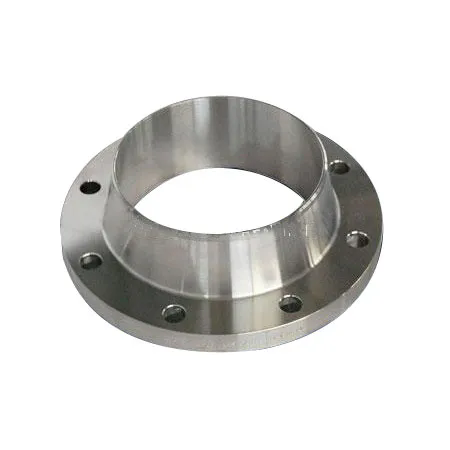A Comprehensive Guide to Forged Welded Neck Flanges
2024-10-11
When it comes to industrial piping systems, the reliability and strength of the connections are crucial to the overall performance and safety of the system. One of the most essential components in these systems is the forged welded neck flange. In this blog, we’ll dive deep into what forged welded neck flanges are, their applications, benefits, and why they are preferred in various industries.
What is a Forged Welded Neck Flange?
A forged welded neck flange is a type of flange with a long tapered hub that is welded to a pipe. The neck, or hub, provides reinforcement to the connection, allowing for better stress distribution in the pipe joint. This makes it an ideal choice for high-pressure environments and systems that experience temperature fluctuations.
The forging process involves shaping the flange under high pressure and temperature, enhancing its mechanical properties and ensuring durability and strength. Welded neck flanges are often used in industries that deal with critical operations such as oil and gas, petrochemicals, power generation, and chemical processing.
Features of Forged Welded Neck Flanges
- Strong Connection: The long tapered neck provides a smooth transition between the flange and the pipe, reducing stress concentration and improving the strength of the joint.
- Resistance to Stress: The design of the neck flange allows for a better distribution of mechanical stress, making it ideal for high-pressure applications.
- High Durability: Since forged flanges undergo intense heat and pressure during the forging process, they have enhanced durability and are resistant to wear, corrosion, and temperature variations.
- Tight Seal: Welded neck flanges provide a tight seal when properly installed, reducing the chances of leaks in the system.
Benefits of Using Forged Welded Neck Flanges
1. Enhanced Structural Integrity
The forged construction ensures that the flange is robust and capable of withstanding high pressures and temperatures. This makes it highly reliable for use in critical applications.
2. High Pressure and Temperature Resistance
Due to their strong design, forged welded neck flanges are suitable for extreme conditions. They can handle high-pressure environments without failure, making them essential in industries like oil and gas or petrochemical plants.
3. Better Stress Distribution
The tapered neck design minimizes stress concentration at the base of the flange, ensuring the longevity of the connection and reducing the risk of fatigue failure in the piping system.
4. Corrosion and Wear Resistance
Forged flanges can be made from various materials such as stainless steel, carbon steel, and alloy steel, all of which provide excellent resistance to corrosion and wear, depending on the environment they are used in.
Common Applications of Forged Welded Neck Flanges
1. Oil and Gas Industry
Forged welded neck flanges are widely used in oil and gas exploration and processing. Their ability to withstand high pressure and temperature fluctuations makes them ideal for pipelines and refinery operations.
2. Power Plants
In power generation facilities, piping systems often carry steam and high-pressure fluids, which makes forged welded neck flanges a preferred choice due to their ability to maintain structural integrity under extreme conditions.
3. Chemical Processing
Chemical processing plants involve handling of highly corrosive substances and require piping systems that can resist degradation. Forged welded neck flanges, especially those made from corrosion-resistant alloys, are commonly used to prevent leaks and system failures.
4. Marine Industry
The marine sector uses these flanges in shipbuilding and offshore platforms, where piping systems must resist saltwater corrosion and high-pressure conditions.
Types of Forged Welded Neck Flanges
Forged welded neck flanges come in various materials and sizes to suit different industrial needs. Some common types include:
- Stainless Steel Welded Neck Flanges: Known for their corrosion resistance and durability, stainless steel flanges are widely used in industries exposed to moisture or corrosive environments.
- Carbon Steel Welded Neck Flanges: Carbon steel flanges are highly durable and cost-effective, making them a common choice for general-purpose industrial applications.
- Alloy Steel Welded Neck Flanges: For extreme temperature and pressure conditions, alloy steel flanges offer superior performance due to their enhanced strength and resistance to corrosion and wear.
Installation and Maintenance Tips
1. Proper Welding
The welding process is critical when installing forged welded neck flanges. It’s important to use the appropriate welding technique to ensure a strong bond between the flange and the pipe, minimizing the risk of leaks or joint failure.
2. Regular Inspections
Even though forged flanges are highly durable, regular inspections are necessary to ensure the flange and its connections remain in good condition, especially in high-pressure systems.
3. Choose the Right Material
Selecting the correct material for your flange based on the operating environment is essential. For example, in highly corrosive environments, stainless steel or alloy steel may be preferable over carbon steel.
Conclusion
Forged welded neck flanges are a cornerstone of many industrial piping systems due to their superior strength, durability, and resistance to extreme conditions. Whether in the oil and gas industry, power generation, or chemical processing, these flanges ensure the safe and efficient operation of critical systems. Choosing the right type and material of flange, along with proper installation and maintenance, will ensure long-lasting performance and reliability.
If you’re looking for high-quality forged welded neck flanges for your industrial application, it’s essential to consult with experienced manufacturers who can provide the right solutions for your specific needs.



